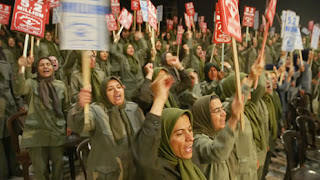An Iranian mystery: Just who are the MEK?
By Owen Bennett Jones
BBC News
The organisation has a history of ideological and tactical flexibility. Since the 1970s, its rhetoric has changed from Islamist to secular; from socialist to capitalist; from pro-Iranian-revolution to anti-Iranian-revolution; from pro-Saddam to pro-American; from violent to peaceful. And there is another dichotomy - it has admiring supporters and ardent critics.Continue reading the main stor“Start Quote Former members consistently describe participating in regular public confessions of their sexual fantasies”
Take, for example, the US military officers who had to deal with the MEK after they invaded Iraq in 2003.
Not only was the MEK heavily armed and designated as terrorist by the US government, it also had some very striking internal social policies.For example, it required its members in Iraq to divorce. Why? Because love was distracting them from their struggle against the mullahs in Iran.And the trouble is that people love their children too.So the MEK leadership asked its members to send their children away to foster families in Europe. Europe would be safer, the group explained.
Some parents have not seen their children for 20 years and more.And just to add to the mix, former members consistently describe participating in regular public confessions of their sexual fantasies.You might think that would set alarm bells ringing - and for some US officers it did.One colonel I spoke to, who had daily contact with the MEK leadership for six months in 2004, said that the organisation was a cult, and that some of the members who wanted to get out had to run away.
And yet another officer, who was there at precisely the same time and is now a retired general, has become an active lobbyist on the MEK's behalf.With his open smile and earnest friendly manner, he is a good advocate. "Cult? How about admirably focused group?" he says. "And I never heard of anyone being held against their will."We later emailed him about a former member who claimed to have told the general to his face that people were held against their will. "He's lying," the general replied.You just have to decide which side to believe.
Ex-MEK member Eduard Termado is now living in Germany.His face is scarred to the point of being misshapen. His complexion is grey, his skin blotched and waxy, and his forehead constantly covered in dribbling beads of sweat - but then he spent nine years as a prisoner of war in Iraq.He joined the MEK hoping to help Iranian democracy and did not like what he saw.He says that after three years he asked to leave, but was told he couldn't. He stayed for 12 years.
He now says joining the MEK was the biggest mistake of his life and he has expressed that feeling in an unusual way.He has married and produced three children. "My family is my protest against the MEK," he says.There are many other stories.Children who never forgave their parents for abandoning them. Children who did forgive and are now joyously reunited. Divorcees who have got out of the organisation saying they still love their former spouses who are still in.In over 25 years of reporting, I have been lied to often enough but, as successive former MEK members told what they had been through, their tears seemed real enough to me.
And yet a significant number of politicians in the US and UK would say I was tricked because the former MEK members who spread these kind of stories are, in fact, Iranian agents.Again, who to believe?In the US in particular, an impressive array of public figures have spoken in defence of the MEK.There are more than 30 big names - people like Rudy Giuliani former mayor of New York, Howard Dean at one time the democratic presidential hopeful, a retired governor, a former head of the FBI.
Many get paid. Of those who have declared their earnings, the going rate for a pro-MEK speech seems to be $20,000 (£12,500) for 10 minutes. But then many other prominent MEK supporters act without payment.Why do people take such strong positions on the MEK?
After a month talking to people on both sides of the argument, I am left thinking this. Some supporters are paid, others see the MEK through the prism of Iran - they will just support anything that offers hope of change there. Many are well motivated but some are naive.And the former members?Some are embittered, others just seem broken.Which is when it occurred to me - the perception people have of the MEK may say more about them than about the organisation itself.It is so difficult to pin down you can see your own reflection in it.



 05.52
05.52
 Unknown
Unknown


 Posted in:
Posted in: 







0 komentar:
Posting Komentar